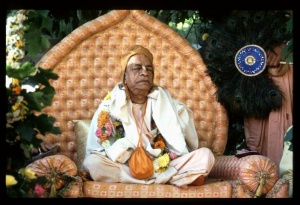CC Madhya 13.187 (1975): Difference between revisions
(Vanibot #0027: CCMirror - Mirror CC's 1996 edition to form a basis for 1975) |
(Vanibot #0020: VersionCompareLinker - added a link to the Version Compare feature) |
||
| Line 2: | Line 2: | ||
<div style="float:left">'''[[Sri Caitanya-caritamrta (1975)|Śrī Caitanya-caritāmṛta (1975)]] - [[CC Madhya (1975)|Madhya-līlā]] - [[CC Madhya 13 (1975)|Chapter 13: The Ecstatic Dancing of the Lord at Ratha-yātrā]]'''</div> | <div style="float:left">'''[[Sri Caitanya-caritamrta (1975)|Śrī Caitanya-caritāmṛta (1975)]] - [[CC Madhya (1975)|Madhya-līlā]] - [[CC Madhya 13 (1975)|Chapter 13: The Ecstatic Dancing of the Lord at Ratha-yātrā]]'''</div> | ||
<div style="float:right">[[File:Go-previous.png|link=CC Madhya 13.186 (1975)|Madhya-līlā 13.186]] '''[[CC Madhya 13.186 (1975)|Madhya-līlā 13.186]] - [[CC Madhya 13.188 (1975)|Madhya-līlā 13.188]]''' [[File:Go-next.png|link=CC Madhya 13.188 (1975)|Madhya-līlā 13.188]]</div> | <div style="float:right">[[File:Go-previous.png|link=CC Madhya 13.186 (1975)|Madhya-līlā 13.186]] '''[[CC Madhya 13.186 (1975)|Madhya-līlā 13.186]] - [[CC Madhya 13.188 (1975)|Madhya-līlā 13.188]]''' [[File:Go-next.png|link=CC Madhya 13.188 (1975)|Madhya-līlā 13.188]]</div> | ||
{{CompareVersions|CC|Madhya 13.187|CC 1975|CC 1996}} | |||
{{RandomImage}} | {{RandomImage}} | ||
==== TEXT 187 ==== | ==== TEXT 187 ==== | ||
| Line 11: | Line 10: | ||
<div class="verse"> | <div class="verse"> | ||
:tomāra upare prabhura suprasanna mana | :tomāra upare prabhura suprasanna mana | ||
:tomā lakṣya | :tomā lakṣya kari' śikhāyena nija gaṇa | ||
</div> | </div> | ||
| Line 18: | Line 17: | ||
<div class="synonyms"> | <div class="synonyms"> | ||
tomāra upare—upon you; prabhura—of Lord Śrī Caitanya Mahāprabhu; su-prasanna—very | tomāra upare—upon you; prabhura—of Lord Śrī Caitanya Mahāprabhu; su-prasanna—very satisfied; mana—the mind; tomā—you; lakṣya kari'-pointing out; śikhāyena—He teaches; nija gaṇa—His personal associates. | ||
</div> | </div> | ||
| Line 25: | Line 24: | ||
<div class="translation"> | <div class="translation"> | ||
Sārvabhauma Bhaṭṭācārya informed the King, | Sārvabhauma Bhaṭṭācārya informed the King, "The Lord is very satisfied with you. By pointing you out, He was teaching His personal associates how to behave with mundane people." | ||
</div> | </div> | ||
Latest revision as of 07:43, 27 January 2020

A.C. Bhaktivedanta Swami Prabhupada
TEXT 187
- tomāra upare prabhura suprasanna mana
- tomā lakṣya kari' śikhāyena nija gaṇa
SYNONYMS
tomāra upare—upon you; prabhura—of Lord Śrī Caitanya Mahāprabhu; su-prasanna—very satisfied; mana—the mind; tomā—you; lakṣya kari'-pointing out; śikhāyena—He teaches; nija gaṇa—His personal associates.
TRANSLATION
Sārvabhauma Bhaṭṭācārya informed the King, "The Lord is very satisfied with you. By pointing you out, He was teaching His personal associates how to behave with mundane people."
PURPORT
Although outwardly the King was a mundane man interested in money and women, internally he was purified by devotional activities. He showed this by engaging as a street sweeper to please Lord Jagannātha. A person may appear to be a pounds-and-shillings man interested in money and women, but if he is actually very meek and humble and surrendered to the Supreme Personality of Godhead, he is not mundane. Such a judgment can be made only by Śrī Caitanya Mahāprabhu and His very confidential devotees. As a general principle, however, no devotee should intimately mix with mundane people interested in money and women.